
by Elizabeth Andoh | Oct 10, 2022 | Autumn, Kitchen Culture
Four varieties of wild-caught salmon are commonly available in markets around the Pacific rim. Left, top to bottom + right: Sockeye (beni-zaké in Japanese) Coho (gin-zaké in Japanese) Chum (aki-zaké in Japanese) Chinook (kingu samon, in Japanese) 鮭・さけ・SAKÉ SALMON Fish...
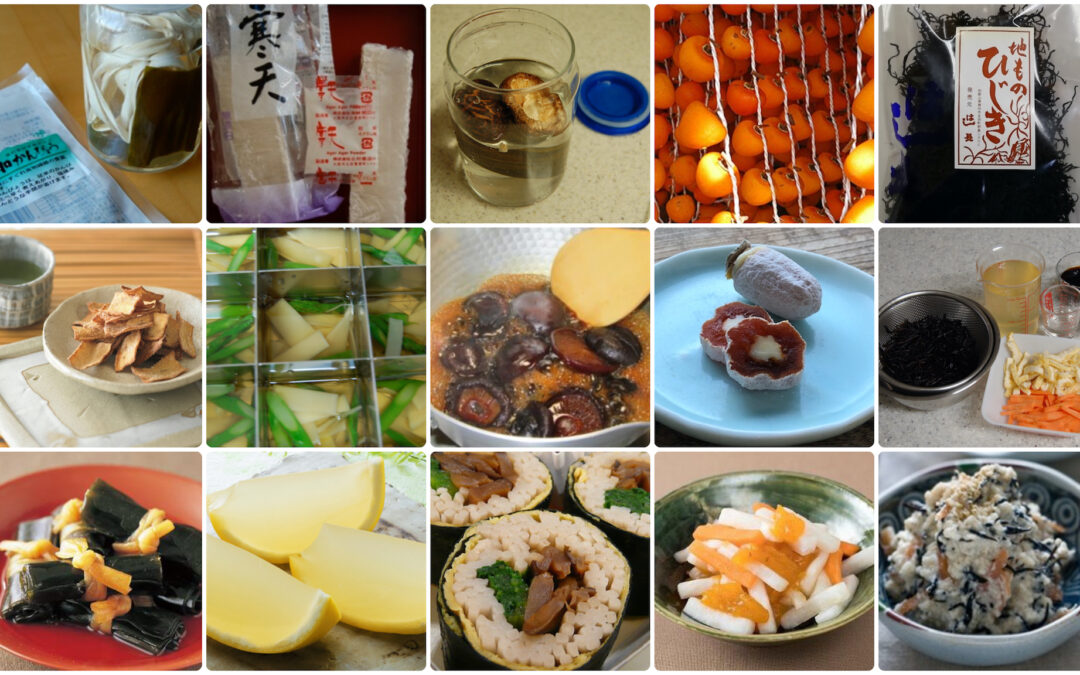
by Elizabeth Andoh | Sep 25, 2022 | Kitchen Culture, Year-Round
In the photo above, there are five vertical columns, from left to right: KAMPYO (soaking in water with kombu; deep-fried to make chips; used as an edible tie for kombu rolls); KANTEN (sticks and powdered form, made into a savory bamboo shoot and asparagus aspic, lemon...
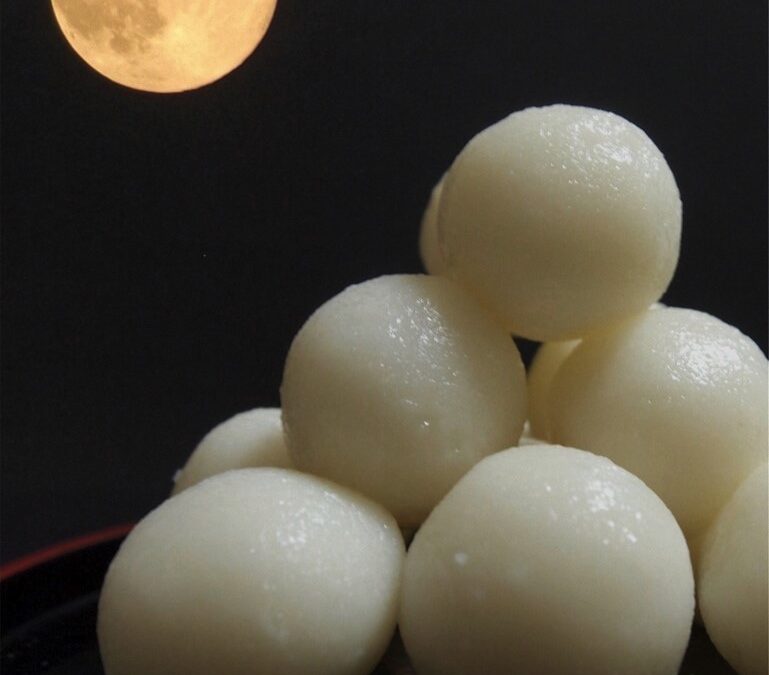
by Elizabeth Andoh | Sep 2, 2022 | Autumn, Kitchen Culture
月見団子 TSUKIMI DANGO The moon can be seen shining from any place on our planet and people everywhere see beauty in a full, luminous moon. But ritual contemplation of the “moon of the middle autumnal month” (chūshū no meigetsu) has its origins in China. The practice...
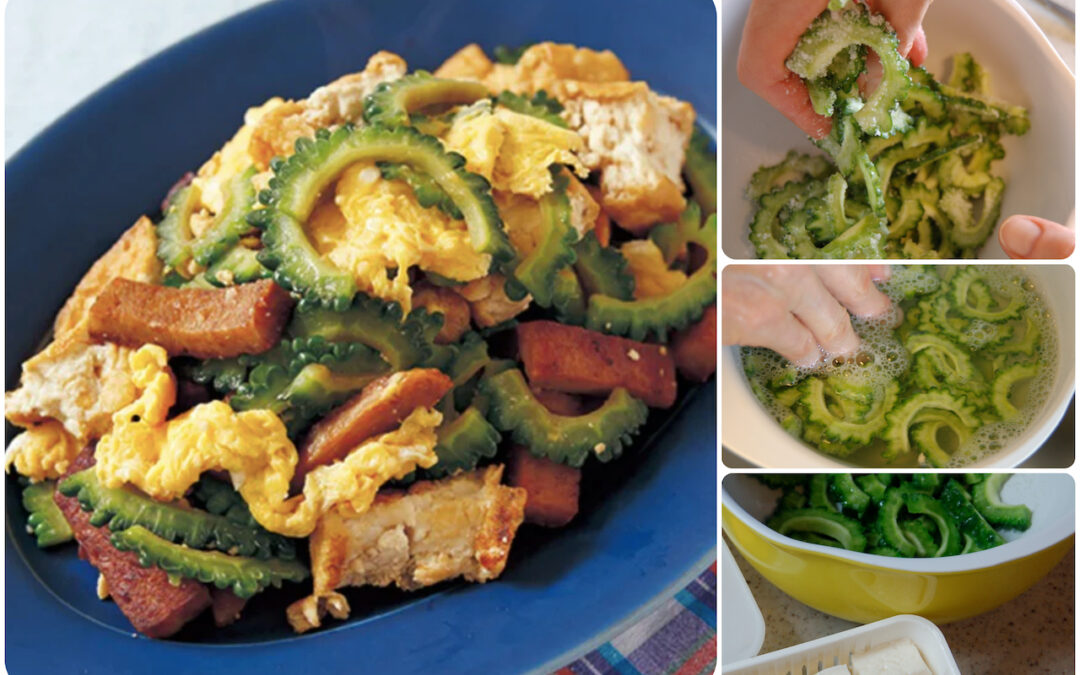
by Elizabeth Andoh | Aug 12, 2022 | Kitchen Culture, Summer
チャンプル・CHAMPURU In the local dialect CHAMPURU means “hodgepodge.” It is essentially a stir-fry; the signature dish of Okinawa. Every household will have its own version though most will include some sort of tōfu and lots of vegetables, most likely bitter melon or what...
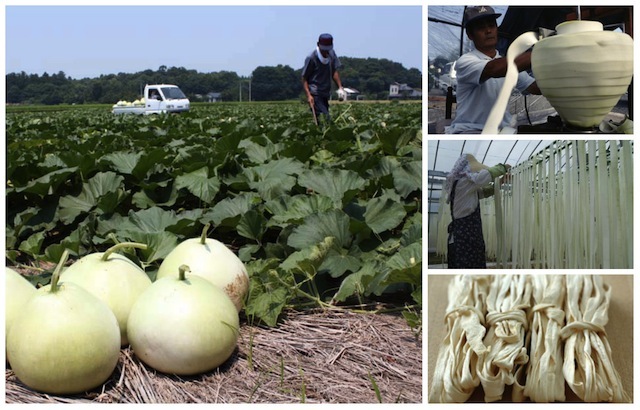
by Elizabeth Andoh | Jul 10, 2022 | Kitchen Culture, Summer
干瓢・かんぴょう・KAMPYŌ What is kampyō and how is it processed into edible ribbons? Bulbous fukubé gourds are harvested in the summer and set on a spinning wheel against a sharp blade. The ribbons of gourd that get shaved off are then hung to dry in the sun or well-ventilated...
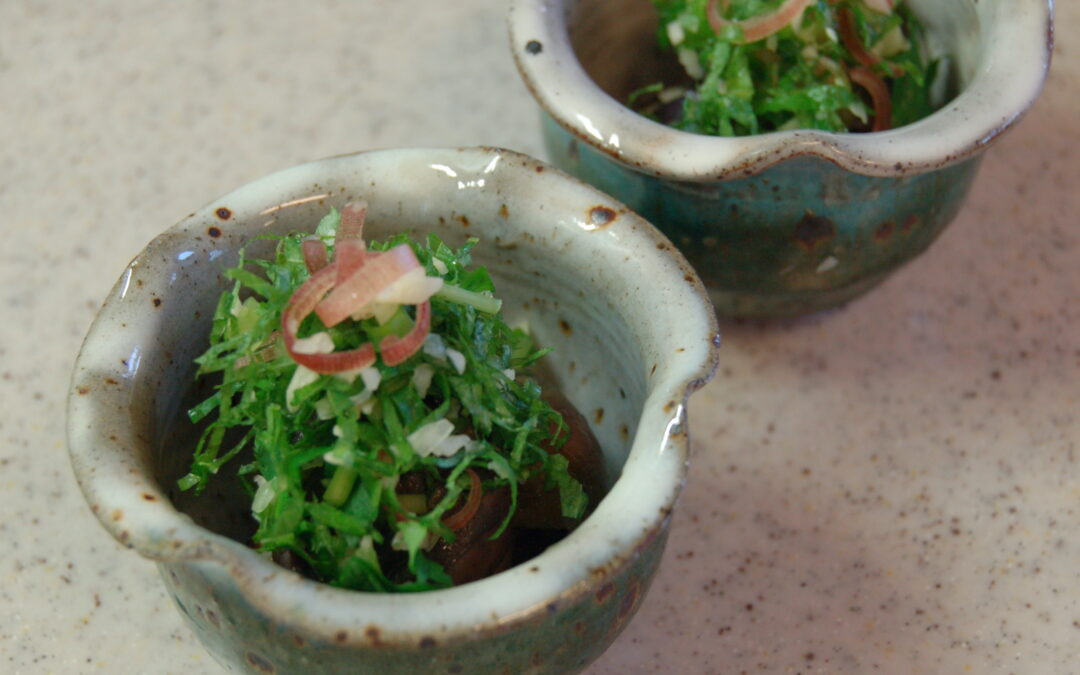
by Elizabeth Andoh | Jun 29, 2022 | Kitchen Culture, Summer
薬味YAKUMI A Lively Mixture of Aromatic Herbs Food cultures around the world employ various aromatic herbs and spices to stimulate the appetite, maximize flavor and promote healthful eating. Japan has a long history of using yakumi, condiments, to provide benefit to the...
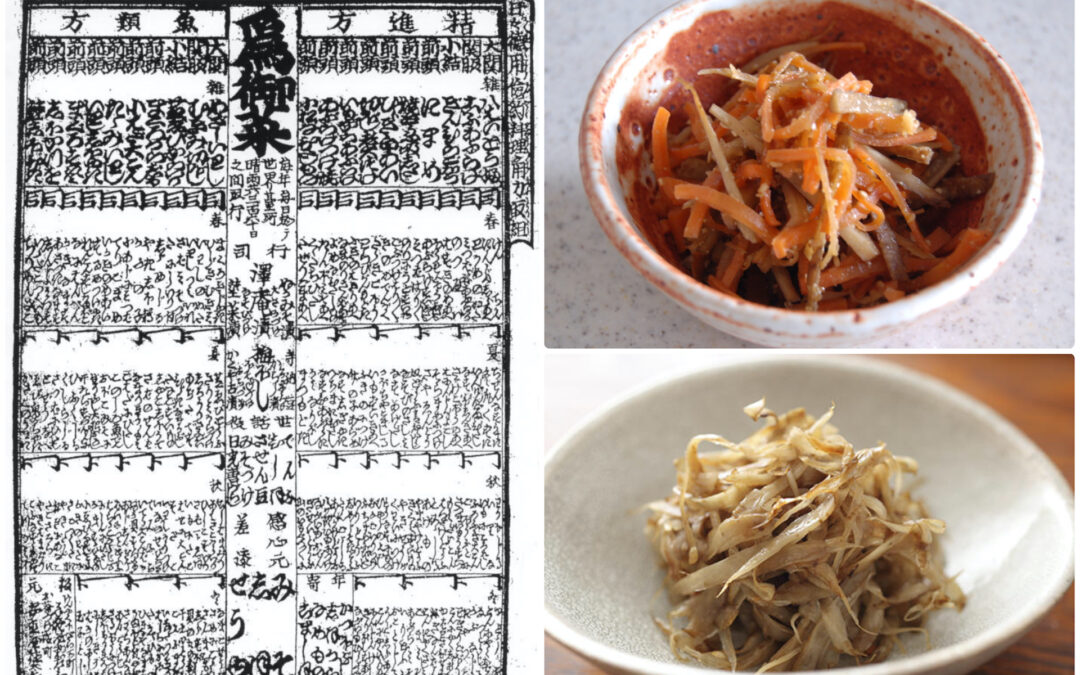
by Elizabeth Andoh | May 16, 2022 | Kitchen Culture, Year-Round
ごぼう・牛蒡・Gobō (burdock root; Arctium lappa) Kimpira, named after a folk-hero celebrated for his fervent determination and fiery ways, is a quickly assembled, skillet-stirred vegetable dish finished with an incendiary 7-spice blend. Kimpira frequently appears on the menu...
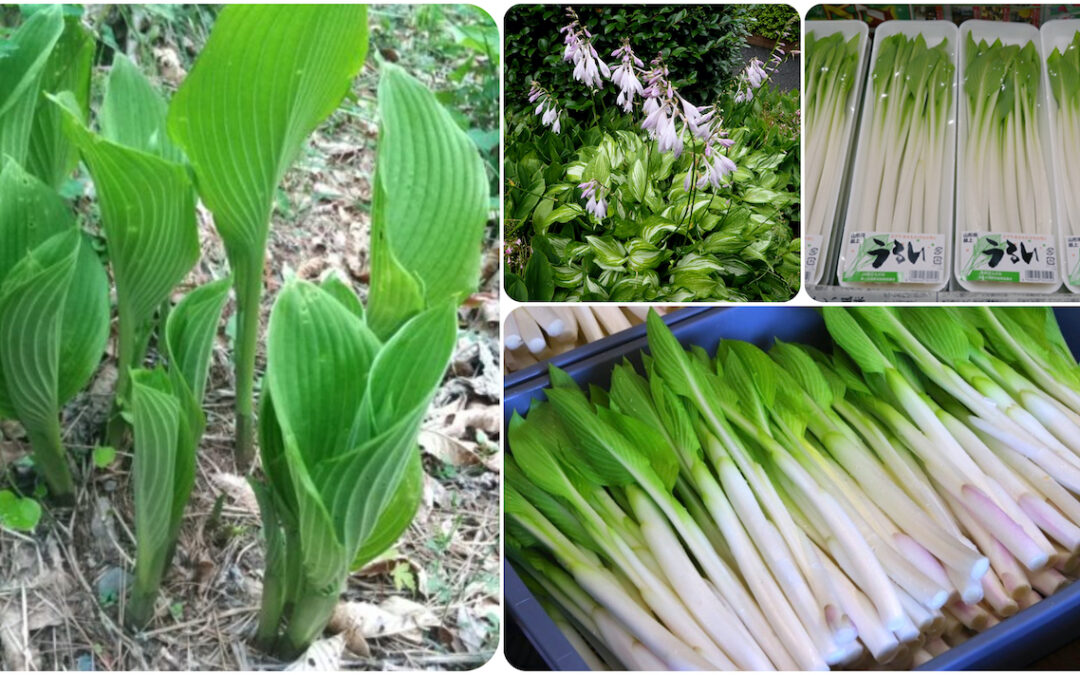
by Elizabeth Andoh | Apr 22, 2022 | Kitchen Culture, Spring
うるい・UruiThe Elusive Taste of Spring Urui (Hosta sieboldiana) is in the lily family; it is often planted as an ornamental in gardens. It thrives in damp soil in areas of partial or dappled shade. It has been cultivated in Japan since the Edo period (1603-1868) though...
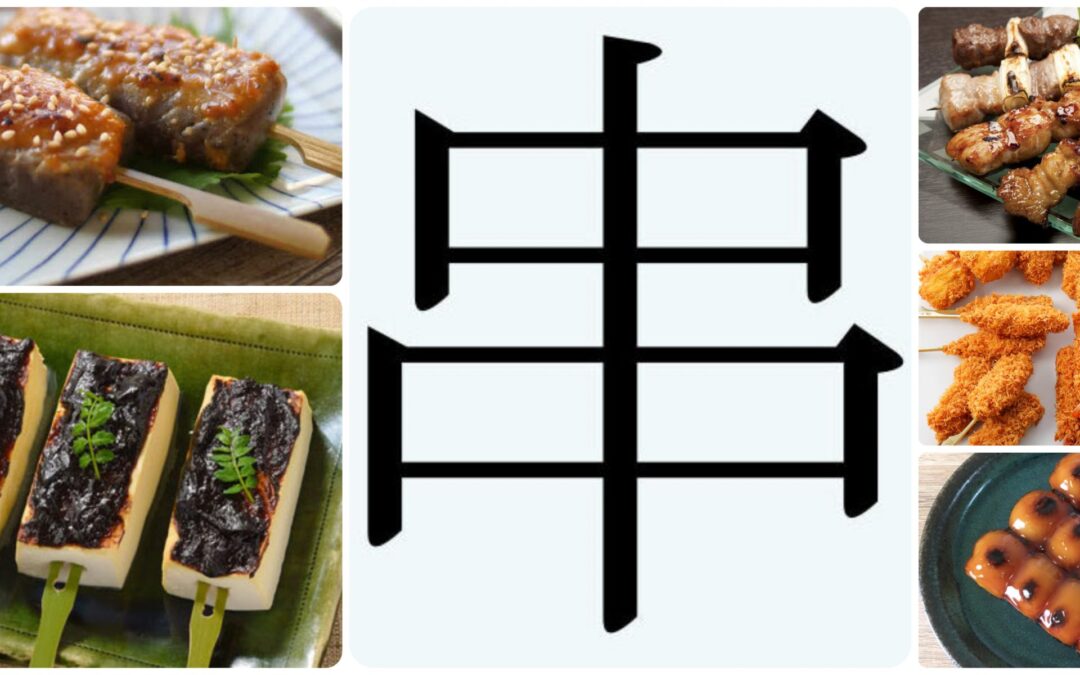
by Elizabeth Andoh | Mar 17, 2022 | Kitchen Culture, Year-Round
串・KUSHISkewers Galore Because spearing or threading food on skewers makes cooking over a fire easier and more efficient it’s not surprising to find some sort of skewered food in nearly every food culture. There is (Brazil’s) churrasco, (Spain’s)...
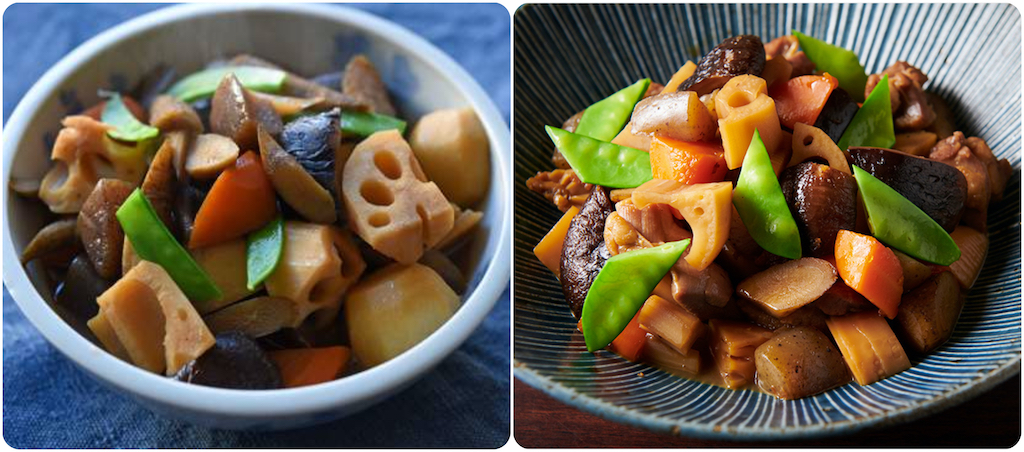
by Elizabeth Andoh | Feb 25, 2022 | Kitchen Culture, Year-Round
筑前煮・Chikuzen NiVegan Version: Soy-Braised Vegetables with Thick Fried TōfuClassic Version: Soy-Braised Vegetables with Chicken Chikuzen is the former name of a province, the area that is today part of Fukuoka Prefecture in Kyūshū. The word “ni” in the title of this...
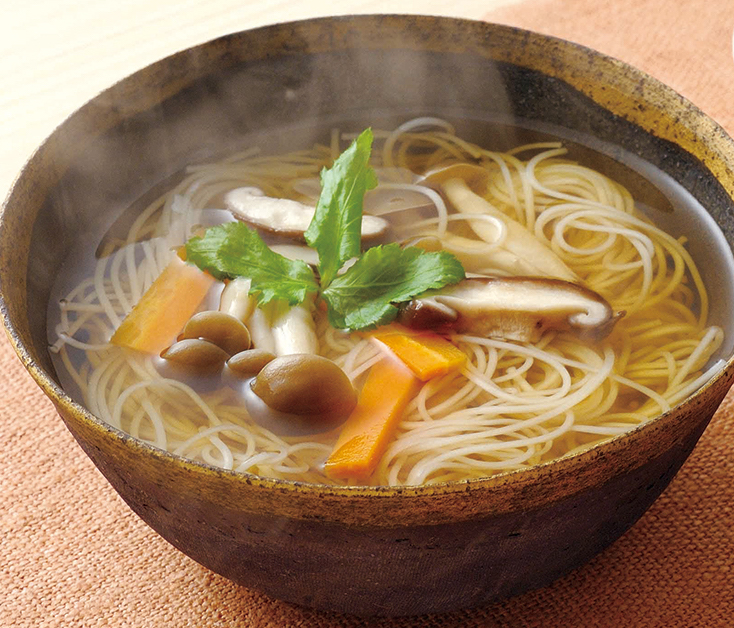
by Elizabeth Andoh | Feb 20, 2022 | Kitchen Culture, Winter
煮麺 ・NyūmenSōmen Noodles Served in Piping Hot Broth Sōmen is usually served chilled, often on chunks of ice. Dipped into a deeply flavored sauce to which condiments have been added, it becomes a survival strategy for hot, humid days. But in Kagawa Prefecture (Shikoku),...

by Elizabeth Andoh | Feb 7, 2022 | Kitchen Culture
柳原 一成 (追悼) A Tribute to Kazunari YANAGIHARA (1942-2022) Shortly after arriving in Japan, I became intrigued with its food and culture. My first forays into the Japanese kitchen were guided by my husband’s family, and by Tokyo neighbors and local shopkeepers. The more...
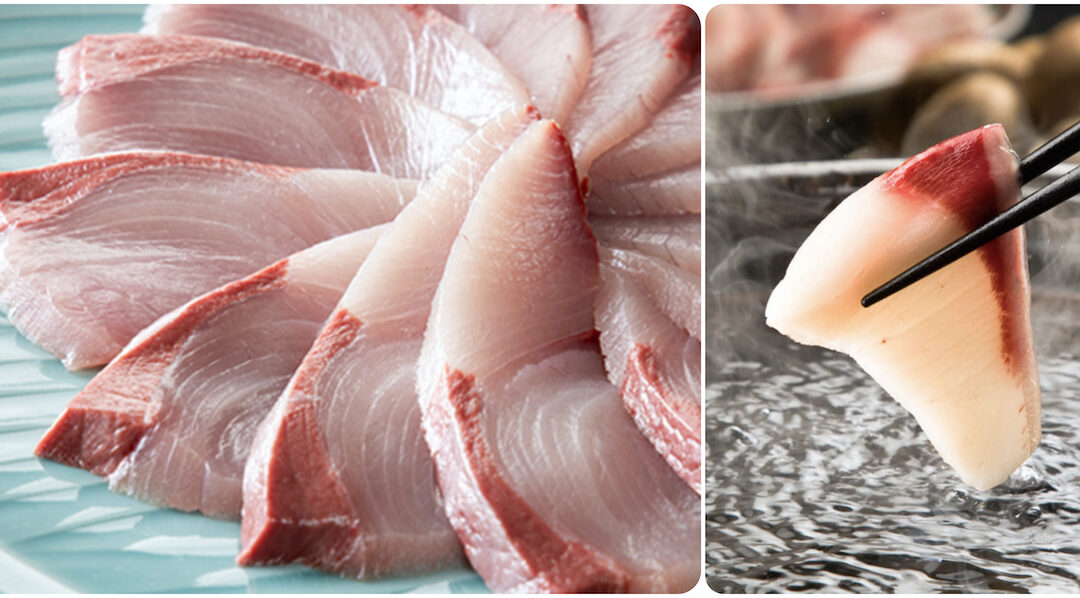
by Elizabeth Andoh | Jan 25, 2022 | Kitchen Culture, Winter
鰤しゃぶ鍋Buri Shabu Nabé BURI (yellowtail) is fabulous in the winter! If you can source top-quality tenderloins of fish, you could opt for luscious slices of sashimi. Though my favorite way to enjoy fresh buri is swished-through-bubbling-broth buri shabu nabé – barely...
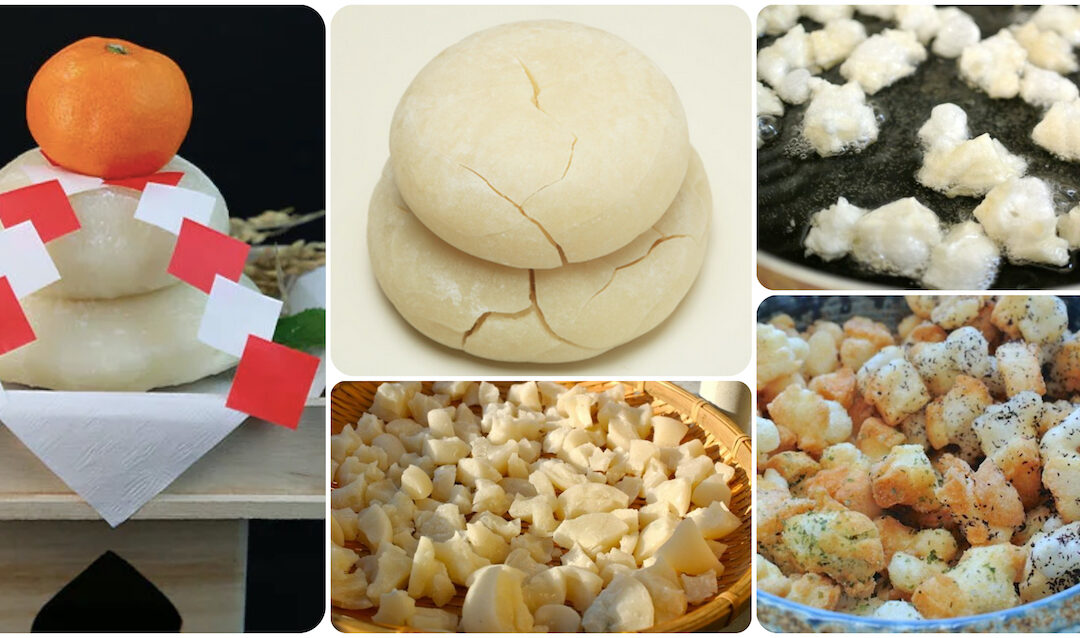
by Elizabeth Andoh | Jan 6, 2022 | Kitchen Culture, Winter
あられ・霰・ARARÉCrisp-and-Crunchy Rice Snacks When listening to the weather report araré means “hailstones” but in the kitchen (or other culinary setting) it means “small cubes” or fine-diced omochi (sticky rice) that has been fried or baked. No doubt the origin of this...
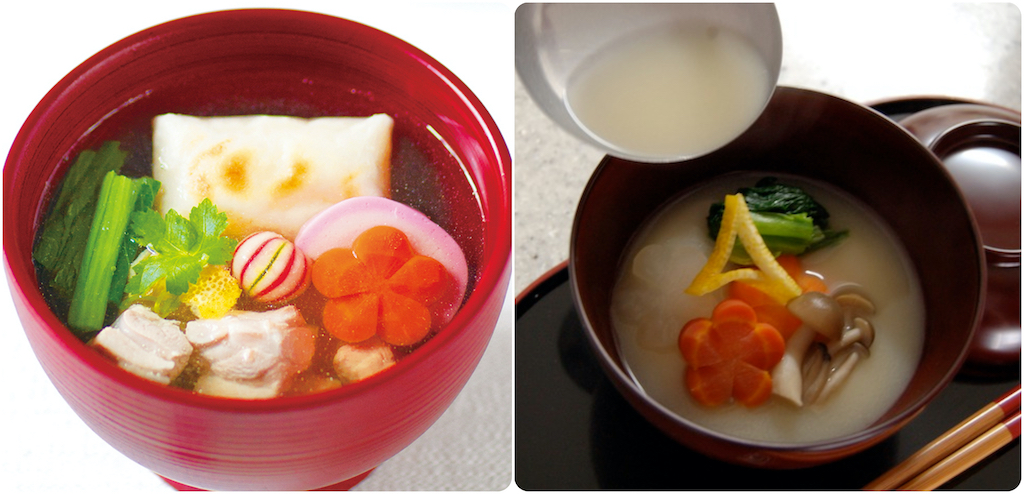
by Elizabeth Andoh | Dec 29, 2021 | Kitchen Culture, Winter
お雑煮Ozōni “Honorable Miscellany Stew” Served for brunch on Gan Jitsu (New Year’s Day), and on many chilly winter mornings thereafter, ozōni is enjoyed throughout Japan. The name of the dish is rather straightforward and descriptive: the “o” is an honorific...
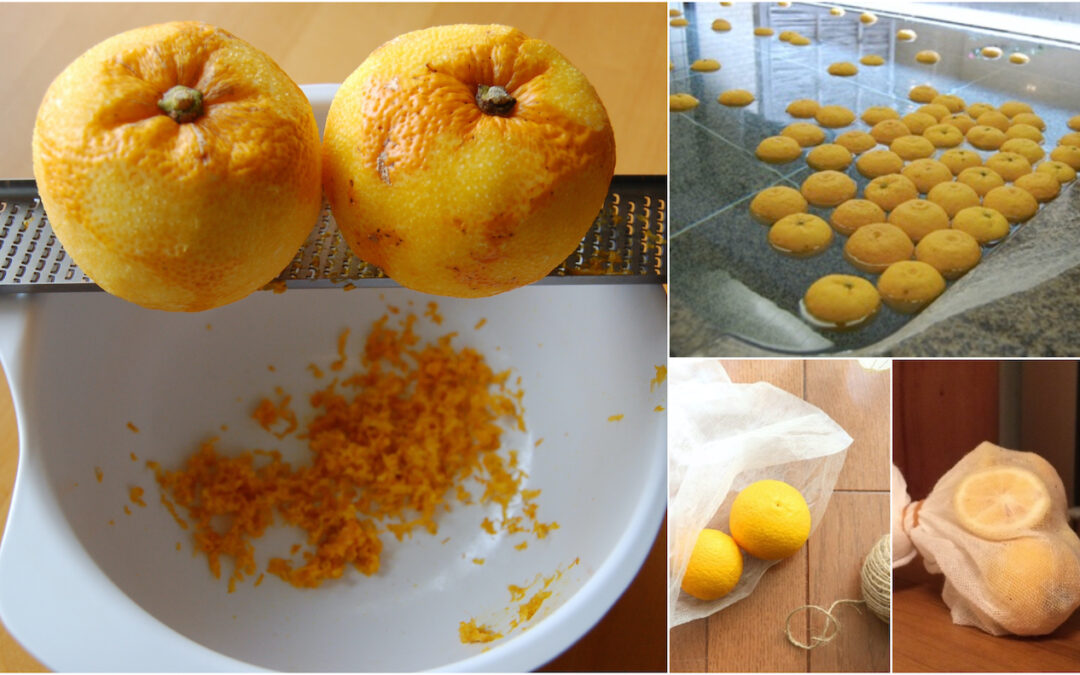
by Elizabeth Andoh | Dec 17, 2021 | Kitchen Culture, Winter
ゆず湯・Yuzu Yu Food customs in Japan often involve word-play. The winter solstice that occurs on or about December 22 is called tōji 『冬至』, literally “winter arrives.” But the word tōji can also be written as 『湯治』meaning “hot-spring cure” or...
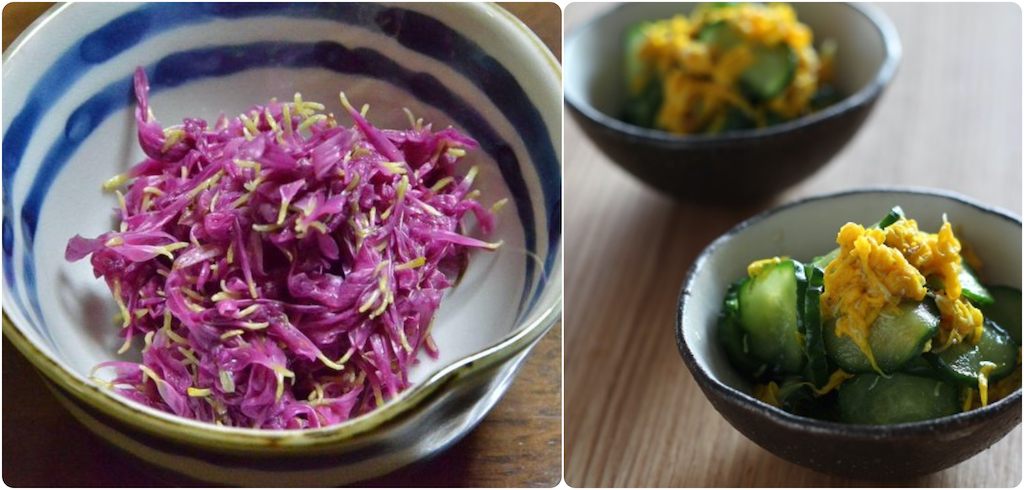
by Elizabeth Andoh | Nov 19, 2021 | Autumn, Kitchen Culture
食用菊 Shokuyō Kiku Edible chrysanthemums are one Japan’s autumnal culinary delights. Commercially cultivated in various parts of Japan today (including Okinawa!) they were traditionally enjoyed in the Tohoku (Akita, Yamagata) and Hokuriku (Niigata) regions. Though...
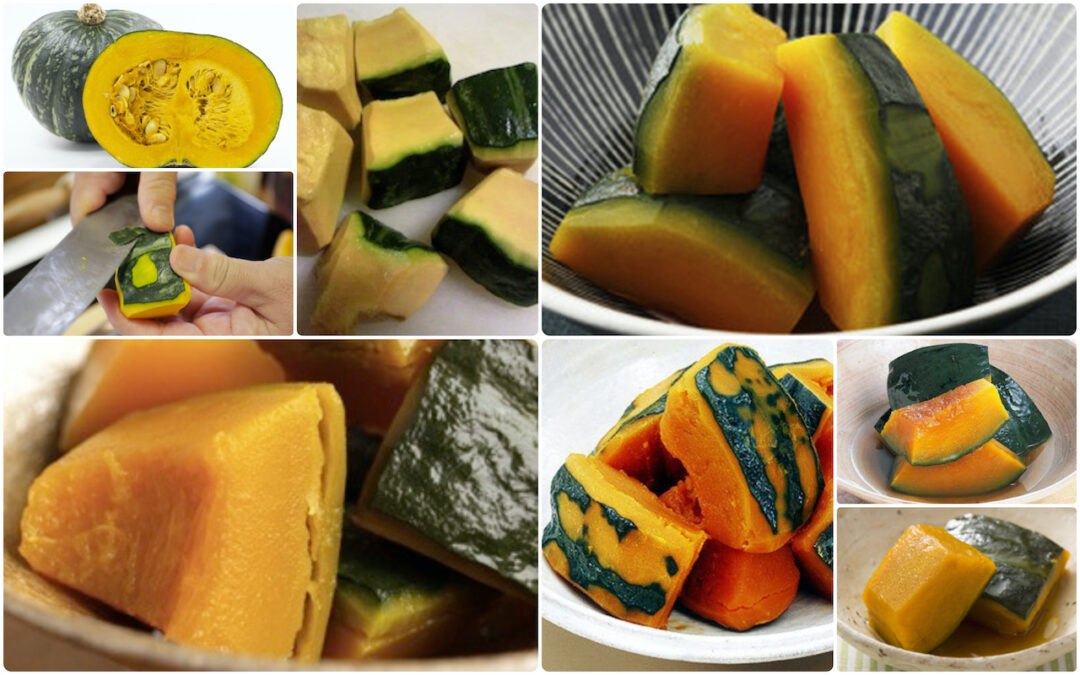
by Elizabeth Andoh | Oct 19, 2021 | Autumn, Kitchen Culture
かぼちゃ・南瓜KABOCHA Written with calligraphy for “southern gourd,” but pronounced kabocha, the name tells the curious history of this gourd in Japan. Kabocha arrived in Oita (on the southern island of Kyushu) in 1541 on a Portuguese ship. The previous port of call along...
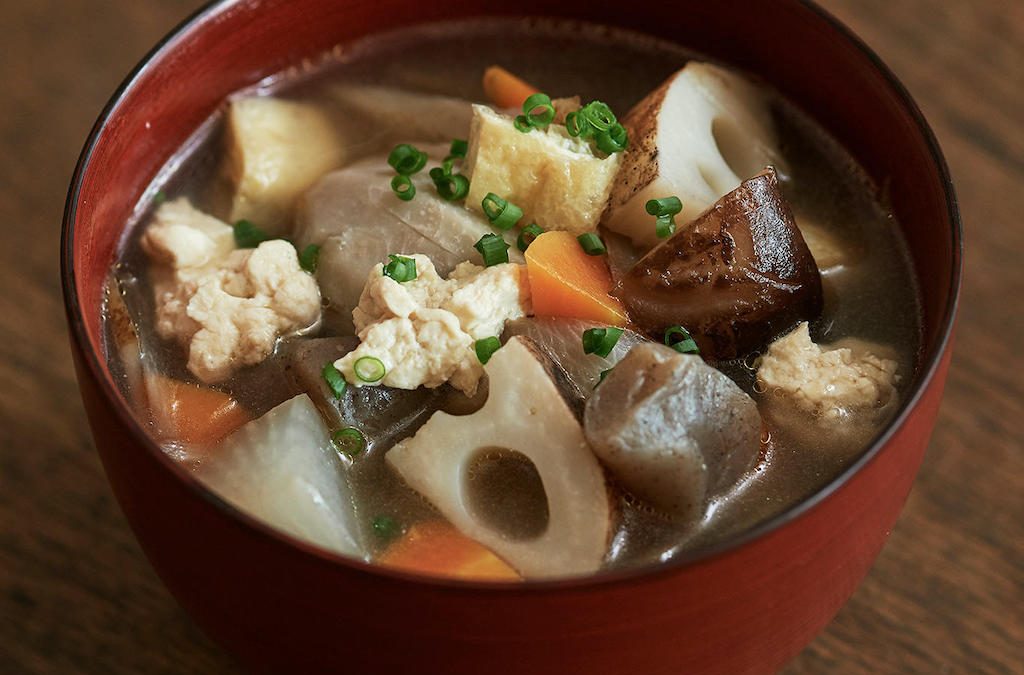
by Elizabeth Andoh | Oct 8, 2021 | Autumn, Kitchen Culture
けんちん汁KENCHIN-JIRU Chunky Vegetable & Tōfu Chowder When autumn evenings turn chilly, its time for a hearty, nourishing chowder. The inspiration for this one, kenchin-jiru, is thought to be resourceful monks at Kenchō-ji Temple (建長寺) in Kamakura. Utilizing vegetable...

by Elizabeth Andoh | Sep 24, 2021 | Autumn, Kitchen Culture
SUDACHI (left) & KABOSU (right) The Japanese have consumed a variety of citrus for millennia, enjoying both the juice and peels of the fruit. Many who reside outside Japan have become familiar with yuzu, a member of the Rutaceae (citrus) family primarily prized for...





















